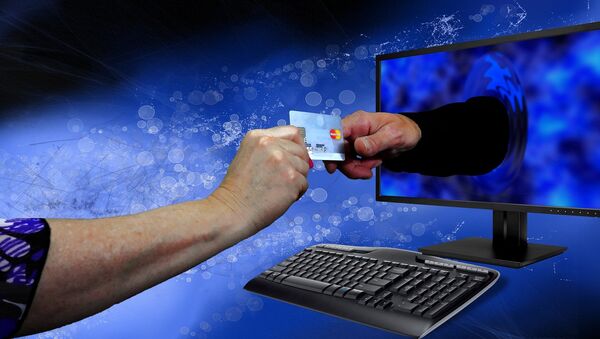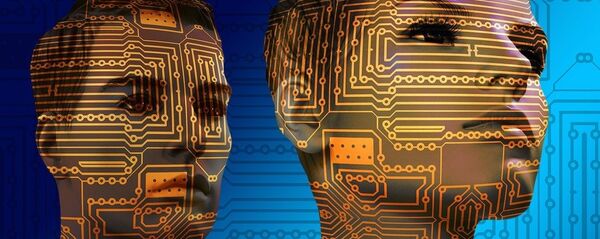Sputnik: You are working with your Russian partners, Yandex Money, here. What are your impressions from the project so far and what are your future plans?
Brett King: We’ve obviously got quite a bit of involvement in Russia. Sberbank led our series A-round; Sberbank tech ventures; and then we’ve deployed Moven’s technology in Yandex.
There’re some similarities between the behaviour of Americans and Russians when it comes to cash; but primarily, I think we’re talking about the role of the bank account in people’s lives. As it changes, people want more information, they want more control; and particularly, they want more awareness of how they are using their money and how they are spending it.
So, this is really the core of the technology we’ve deployed with the Yandex team here in Russia.
Brett King: I think if you evolve the bank account – and we see where that is going – your bank account in a few years will have to have AI in it. And the expectation will be that it’ll be smart enough to answer basic questions about how you use your money, like “Hey Siri, can I afford to go to dinner tonight?
Can I afford to buy a new iPhone?” or “Alexa, when will I be able to buy a new house or apartment?” These are questions people, I think, would like the answers to.
Today, you have to go to a financial advisor or a financial coach; but in the future I think your bank account will be smart enough to help you through those sorts of decisions. That’s really what we are working on – trying to get that technology right.
Sputnik: But what’s the profit for banks then? Wouldn’t they object to this kind of education, because they live off people’s debt?
But as fintech has come into the space, and players like Yandex are coming into the space, or Alipay and Tencent’s WeChat Pay in China, you are having sort of a fragmentation of banking services. So bank cannot sit on their laurels anymore saying “we’ve got your bank account and you have to come to us to get your car loan and your mortgage and all of these things”.
Banks will have to provide real value to customers beyond products; that’s where we think financial health is sort of a baseline of what a bank account should do for you. If your bank account makes you financially unhealthy, it’s a bad thing, right?
Sputnik: Your company has released several versions of the Moven financial app. Is it hard to teach people to start using apps for banking? Because I know that in the US people still use paper cheques; in Russia, they’d prefer to deal with a person, with a clerk. Is it hard for people to switch to these things?
Brett King: We haven’t found it difficult to get people to switch. I think what happens is that people initially try your app or your service in terms of maybe just discretionary spending, like using it for things like online purchases, shopping, groceries, things like this, before they get their salary transferred to the service.
About three months in, what we find is that as people see their receipt coming through, this changes the way they spend because they are not aware that they are spending so much on coffee at Starbucks or something like this. So, just by making people aware of this, over three months we found them decreasing their spending between about five to eight percent.
All we’ve done is make them aware of their spending; but you have you do it in real time. It has to be in the moment, like when you’re at Starbucks you get the receipt saying “you’ve already spent a thousand roubles on Starbucks this month”; and you’re like “this is crazy, I can’t have spent that much money”. And that’s what really helps to change your behaviour, that awareness.
Sputnik: Besides AI and machine learning, in your opinion, what are the technologies that we might see enter the market within one or two years and become as big?
Brett King: The big shift with banking, in particular, will be that it’s going just be available when and where you need it.
Banks will say “you need a credit card to solve this in case you have this problem”; but with technology, when you walk in a grocery store in a few years, you’ll get a message on your phone saying “it looks like you don’t have enough cash to do your groceries today; would you like some credit to do this?” So, it will be embedded in your life; banking will be seamless.
You won’t have to sign a piece of paper; you won’t have to see a person at a branch to get access to your day-to-day banking functionality.
That’s the biggest shift; we’re sort of moving from these bank products and services that we used to get through the branch, to the utility of banking that’s available through the technology layer. Then two big technologies will sort of change the way we access banking – one will be voice-based AI, and in a few years smart glasses. We know that Apple, Facebook, and others are working on this technology to have spatial computing.
Sputnik: Smart Glasses backfired on Google…
Brett King: The Google Glass was a transitional product; it was an early phase of this. But I think that people were more worried about recording and so forth. But I think once you have a computer interface, you feel the view that you can use – a screen that will pop up, and you’ll be able to see your GPS indicator as you’re running or cycling.
So, computing is becoming like electricity – it’s just embedded in the world around us with this intelligence and the interface is disappearing from something you need to manipulate to just being responsive to you as you go through the world.
So, using your behaviour, voice, gestures – this is the way we’ll operate computer systems in the future.
Sputnik: But with all of this, probably one of the aspects you’ve just mentioned - is the fin-tech and tech industry mature enough to implement these things? Because we see people and customers becoming the product, with Facebook and other companies selling people’s data? Wouldn’t it require a change on behalf of the industry, because there are some ethical concerns?
Brett King: I do think there are definitely ethical considerations; when it comes to the use of your money, that’s pretty personal. And the other area probably would be health data as well. I think there needs to be a level of scrutiny about how this data is handled. But the easiest way to solve this problem is having a clear value exchange.
If you are an organisation and you want access to your banking data, you need to be able to show me that I’m going to get some benefit from giving that information to you.
I think that’s the difference between the Facebooks of the world that have made you the product as the consumer and use your data to make revenue versus in the future, an organisation saying “if you give us this data, for example your behavioural data where you go shopping and what you buy, in return for that this is what we are going to give you – we are going to give you discounts at stores; or we are going to give you preferential treatment or whatever the value proposition is”.
Sputnik: In the case of Moven, it’s financial advice, right?
When we were pitching Moven to the US federal regulators, like the CFPB, we actually said: “we are the only bank account, the only debit card in the United States that actually helps you save money”.
Because the other savings mechanisms in the US were all passive – open a savings account, here’s the interest rate you can get if you open this savings account; but they didn’t encourage people to save every day.
We do that with messaging, notifications - we call them nudges. What’s really interesting is that we found different times of the week, different days of the week that are the best times to actually message someone to get them to save. It’s mechanisms like that that I think really differentiate us.









